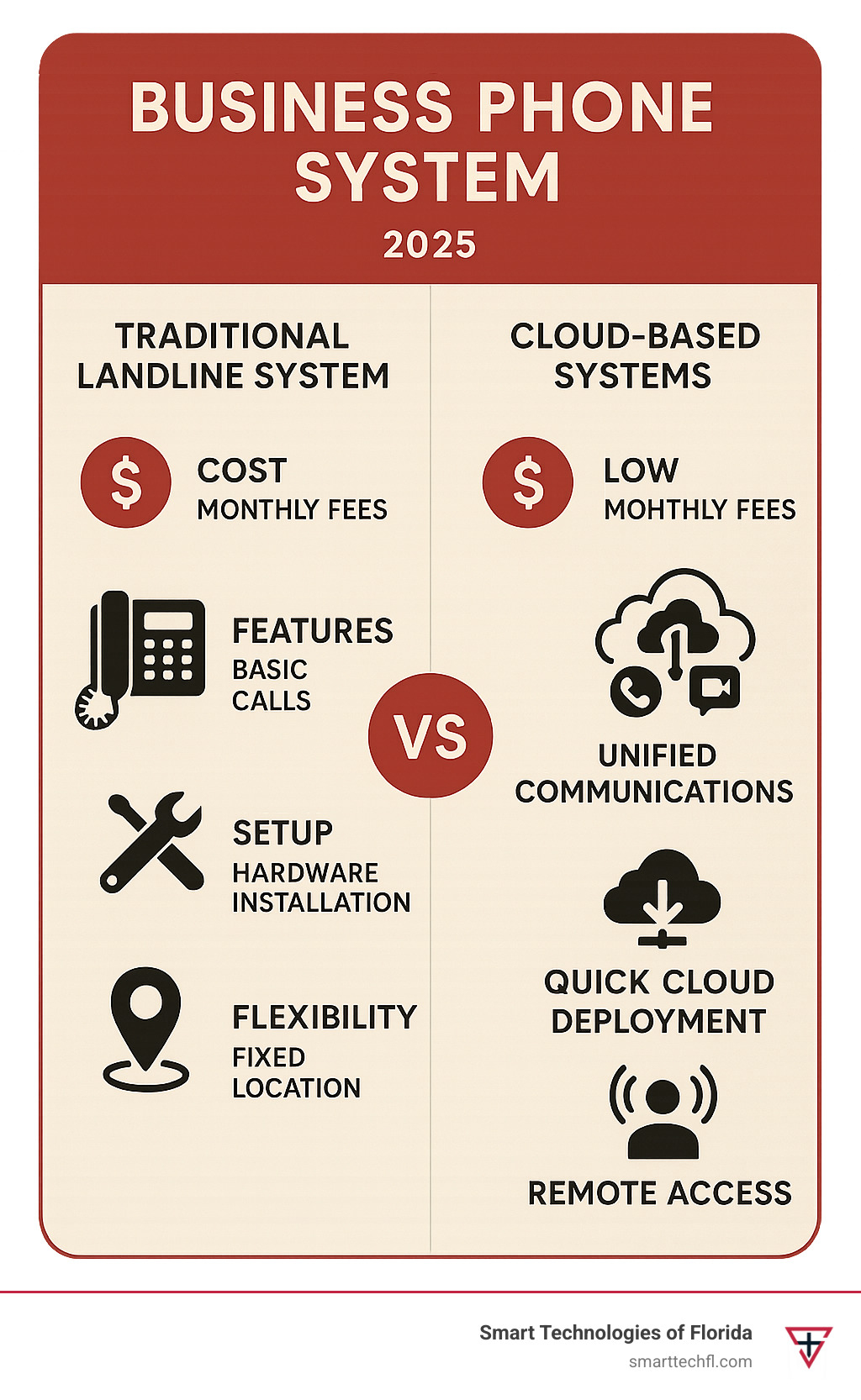Best Business Phone Systems to Keep Your Small Business Connected
A business phone system is no longer just about making calls. For today’s small and medium-sized businesses, it’s a vital tool for growth and efficiency.
Here’s why modern systems stand out:
- Cost Savings: Significantly reduce monthly communication expenses compared to old landlines.
- Advanced Features: Access powerful tools like virtual receptionists, video conferencing, and team messaging.
- Mobility: Connect your team from anywhere, using desk phones, computers, or smartphones.
- Easy Setup: Get up and running quickly, often in minutes, without complex installations.
Remember those old landline phones? They were simple, but they lacked flexibility. For many retail owners, these systems meant high costs and constant maintenance. They tied your business to a physical location.
Then came Voice over Internet Protocol (VoIP) technology. This changed everything.
A modern business phone system uses VoIP to send calls over the internet. This shift brings huge advantages. It turns your phone system into a powerful communication hub. It helps you serve customers better and connect your team, no matter where they are.
This article will guide you through understanding these systems. You’ll learn about their key features, how they save money, and how to pick the right one for your business needs.

What is a Modern Business Phone System and How Does It Work?
At its heart, a modern business phone system is powered by something truly clever: Voice over Internet Protocol, or VoIP. Think of it like this: your voice, instead of trudging along old-fashioned copper phone lines, gets a digital makeover! It’s transformed into tiny digital signals, just like the data that makes up an email or a webpage. These digital voice signals then zoom across the internet at lightning speed to their destination. Once there, they’re instantly converted back into crystal-clear, understandable audio. It all happens so fast, you won’t even notice the magic behind it!
This digital change brings incredible freedom. Gone are the days of needing a bulky, expensive Private Branch Exchange (PBX) box taking up space in your office closet. Modern systems are largely “cloud-hosted.” This means the brain of your phone system lives securely on powerful servers in specialized data centers, all managed by your service provider. This “cloud-based” approach frees you from the hassle and expense of owning and maintaining complex on-premises equipment.
With a cloud-hosted business phone system, your calls travel over the internet, giving you unparalleled mobility. You’re no longer stuck at your desk to answer business calls! Your phone system can truly go wherever you go. Whether you prefer a dedicated IP desk phone, a “softphone” app right on your computer, or a mobile app on your smartphone or tablet, you can make and receive business calls from anywhere with an internet connection. Some systems can even work with your existing analog phones using a simple adapter. It’s like having your entire office communication hub in your pocket!
For a deeper dive into how this technology revolutionizes communication, explore our insights on Business Communication Solutions: VOIP.
Key Differences from Traditional Phone Lines
The shift from traditional landlines to a modern business phone system isn’t just a small upgrade; it’s a monumental leap forward for small and medium-sized businesses. The differences are truly profound and can impact your bottom line and daily operations in a big way:
First off, let’s talk about Cost Savings. This is often the immediate “aha!” moment for businesses. Traditional landlines can easily cost between $40 to $50 per line each month. Cloud-based phone systems, however, can slash your communication expenses by a significant 40% to 60% compared to those old monthly charges. Some businesses even find international calling becomes up to 90% cheaper with business VoIP. These modern systems usually range from $10 to $75 per user per month – a stark contrast to the old, rigid ways.
Then there’s Scalability. Remember the headache of trying to add a new phone line with an old system? With VoIP, it’s incredibly simple. Need a new employee? You can effortlessly add new phone numbers and extensions digitally, without any messy physical wiring or technician visits. Whether you’re a team of five or rapidly expanding, a cloud-based system grows (or shrinks!) effortlessly with your business.
The Feature Set is where modern systems truly shine. While old landlines offered basic calling and maybe a clunky answering machine, a modern business phone system comes packed with over 100 features! We’re talking about incredibly helpful tools like virtual receptionists to greet callers professionally, smart call queues to manage busy periods, voicemail-to-email transcription so you can read your messages, and even on-hold music to keep callers entertained. These are features traditional systems simply can’t provide without significant, often costly, upgrades.
And the best part? Maintenance becomes a breeze – or rather, it disappears for you! Since the system is cloud-hosted, there’s no expensive on-premises hardware for you to manage or repair. Your provider handles all the technical upkeep, updates, and troubleshooting. That frees up your valuable time and resources to focus on what you do best: running your business.
Perhaps one of the most powerful differences is Location Independence. Your business is no longer chained to a physical office. Employees can work seamlessly from anywhere – whether that’s your main office in Daytona Beach, FL, a cozy home office, or even while traveling. Calls can be seamlessly routed to any device, ensuring you never miss an important conversation or opportunity, no matter where your team is.
Finally, you gain incredible Reliability and Uptime. Modern providers build their systems on robust, globally redundant infrastructures. This means they’re designed for zero tolerance on downtime, ensuring your communications are always up and running. They also employ rigorous security and data best practices, integrating security principles into every step to ensure your calls and information are always secure and available.
To understand more about how these benefits translate into real-world advantages for your company, check out our insights on Cloud Business Communications Benefits.
The Core Technology: Voice over IP (VoIP)
Let’s dive a little deeper into the magic of VoIP, but don’t worry, we’ll keep it simple! At its core, VoIP works by taking your analog voice signals (what you say into the phone) and converting them into tiny digital “data packets.” Imagine these packets like little digital envelopes, each carrying a fragment of your conversation. These envelopes then zip across the internet. Once they arrive at the other end, they are quickly reassembled in the correct order and converted back into an analog voice signal, allowing the person on the other end to hear you perfectly clear.
For this digital magic to happen smoothly, a stable internet connection is absolutely crucial. We generally recommend at least 1 Mbps of internet bandwidth for each user to ensure crystal-clear, HD voice quality. A strong, reliable internet connection, along with a good router and modem, forms the backbone of your VoIP system. You can test your internet connection speed to see if it meets these requirements. Providers also use smart technologies like Quality of Service (QoS) to prioritize voice traffic, making sure your calls stay clear even when your network is busy with other internet activities.
While most calls happily stay within the internet, sometimes you need to connect with someone still using an old-school landline. This is where a Public Switched Telephone Network (PSTN) gateway steps in. It acts as a helpful bridge, translating those digital VoIP packets back into signals that traditional phone networks understand. This seamless connection means you can call anyone, anywhere, regardless of their phone system.
The true beauty of this technology is the significantly reduced infrastructure needs for your business. Gone are the days of complex wiring, dedicated phone lines running into your building, and rows of blinking equipment. With VoIP, your existing internet connection is practically all you need to power your entire communication system. It’s simpler, cleaner, and much more efficient.
For more detailed information on how this powerful technology can benefit your business, read our article on VOIP Business Solutions.
Top Features and Functionalities for Small Businesses

A modern business phone system truly offers more than just making and receiving calls. It transforms your communication from a basic necessity into a strategic asset. Many of these systems boast over 100 features, turning what used to be separate tools into a unified communications hub. This integration isn’t just convenient; it streamlines workflows, boosts productivity, and improves both employee and customer experiences.
To understand the full spectrum of possibilities, take a look at our guide on Top VOIP Features for Small Businesses.
Essential Call Management Features
These are the features that make your phone system work smarter, not harder:
- Auto-Attendant (Virtual Receptionist): Imagine a friendly, automated voice greeting your callers and directing them to the right department or individual (“Press 1 for Sales, Press 2 for Support”). This ensures calls always reach their intended destination quickly, even outside business hours, and provides a professional image for your business.
- Call Forwarding: Never miss a call again. Easily forward calls to your mobile phone, another extension, or voicemail, ensuring flexibility for remote workers or when you’re out of the office.
- Ring Groups: Direct incoming calls to multiple extensions simultaneously or in a specific sequence until someone answers. This is perfect for departments like sales or customer service, distributing the workload efficiently.
- Call Queues: When all your lines are busy, callers can be placed in a waiting queue, listening to custom music or messages until an agent becomes available. This prevents lost calls and improves customer satisfaction.
- Voicemail-to-Email Transcription: Receive your voicemails as text in your email inbox. This allows you to quickly scan messages and prioritize your callbacks without having to listen to every recording.
- Call Recording: Essential for quality control, training, or record-keeping, call recording allows you to capture conversations for future reference. This can be set up for specific extensions or on-demand.
- On-Hold Music: Keep callers engaged and entertained while they wait. You can choose from a library of music or upload custom messages, turning hold time into a branding opportunity.
Unified Communications and Collaboration Tools
Beyond basic voice calls, modern business phone systems are becoming comprehensive unified communications (UC) platforms. They bring together all your communication channels into one seamless experience, boosting collaboration and efficiency.
- Video Conferencing: Conduct face-to-face meetings with team members or clients, no matter their location. Many systems offer video meeting capacities ranging from 5 to 1,000 participants, complete with screen sharing, recording, and online whiteboarding features. This is invaluable for remote teams and client presentations.
- Team Chat and Messaging: Internal chat features allow for instant communication between colleagues, reducing email clutter and fostering quick decision-making. You can easily share files, links, and quick updates.
- Business SMS/MMS: Send and receive text messages using your business phone number. This is a powerful tool for customer engagement, allowing for quick responses, appointment reminders, or promotional messages. SMS/MMS limits vary widely, from 25 messages per user per month to 2,000 messages per day, so it’s worth checking what’s included.
- File Sharing: Many UC platforms include integrated file sharing, allowing you to securely exchange documents and media within your team chat or during video conferences.
- Presence Status: See at a glance if a colleague is available, on a call, in a meeting, or away from their desk. This saves time and ensures you connect with people when they’re most accessible.
Find how these integrated tools can transform your workflow by visiting our page on Unified Communications Solutions.
Administration and Analytics

One of the unsung heroes of a modern business phone system is its administrative simplicity and powerful analytics. Gone are the days of needing a dedicated IT expert to make simple changes to your phone system. With cloud-based solutions, centralizing management is incredibly easy.
Most systems feature intuitive, web-based admin portals that allow you to provision, manage, and customize your entire phone system from anywhere. Need to add a new employee? No problem! Initiate instant employee moves, adds, and changes with just a few clicks. Managing multiple locations or phone numbers also becomes a breeze, eliminating the cost and complexity of disparate systems.
The true power lies in the analytics and reporting capabilities. These systems provide in-depth insights in real-time, allowing you to monitor call volumes (incoming and outbound), track user activity, and assess overall system performance. You can customize your own dashboards with over 30 pre-built Key Performance Indicators (KPIs), giving you instant oversight and the ability to troubleshoot quality issues quickly. Understanding your call data helps you optimize staffing, improve customer service, and make data-driven decisions.
For more insights into managing your communications efficiently, check out our article on Centralized Communication for Businesses.
How to Choose the Right Business Phone System
Choosing the right business phone system feels like a big step, doesn’t it? It’s more than just picking a new phone service; it’s about finding a communication partner that truly understands your business. It’s a strategic decision that can make a real difference in how your operations run and, ultimately, your bottom line. At Smart Technologies of Florida, we believe it’s about aligning a solution with your current challenges and what you dream for your future growth.
So, where do you start? Begin by thinking about what isn’t working right now. Are you missing important calls? Is your team struggling to connect, especially when working remotely? Are those monthly phone bills making you wince? Once you pinpoint these “pain points,” consider where you’re headed. Planning to expand your team, accept more remote work, or open new locations? These insights are your compass, guiding you toward the perfect business phone system.
For a comprehensive guide that walks you through this crucial decision-making process, dive into our Communication Solutions Guide for Businesses.
To give you a head start, here’s a quick look at how different business types might approach this choice:
| Business Type | Key Considerations | Recommended Features |
|---|---|---|
| Remote-first Teams | Seamless collaboration, mobility, strong internet reliance, multiple device support. | Unified Communications (UC) platform, video conferencing, team chat, robust mobile apps. |
| Retail & Sales | Easy customer contact, professional image, quick call routing, handling high call volumes, seasonal scalability. | Auto-attendant, call queues, business SMS, easy user adds/deletes. |
| Professional Services | Reliability, client privacy, integration with existing tools (CRM), professional call handling, precise record-keeping. | Advanced call management, CRM integration, call recording, secure communication protocols. |
Assessing Your Team’s Needs and Scalability
When you’re looking for a new business phone system, it’s super important to think about your team. How many people will be using the system? What’s your typical call volume like – a gentle trickle or a constant flood? Do you have a mix of remote and in-office staff? A system that works great for a small office might not be the best fit for a sprawling remote team, and vice versa. You want a system that makes everyone’s day easier, not harder.
Don’t forget to consider if you have any international calling needs. Some systems offer excellent rates for global calls, which can be a huge money-saver. And think about how well the new phone system will integrate with your existing tools, like your Customer Relationship Management (CRM) software or your helpdesk system. Seamless integration means less manual work and a more connected workflow. Choosing a system that can grow with you, effortlessly adding new users or features as you expand, is key to long-term success. For more on systems that scale with you, check out our Enterprise Grade Communication Systems Guide.
Understanding Pricing and Potential Savings
Let’s talk about money! One of the big draws of a modern business phone system is the potential for significant savings. Most providers use typical pricing models like per-user, per-month fees, which makes budgeting straightforward. You might also find options for annual vs. monthly billing, with annual plans often offering a discount. We mentioned earlier that businesses can often see cost savings of 40-60% compared to traditional phone lines – that’s a huge chunk of change that can be reinvested into your business!
You’ll also want to look at whether a plan offers unlimited vs. metered calling. For businesses with high call volumes, unlimited plans are often the way to go to avoid surprise charges. Be sure to factor in any potential hardware costs if you need new IP phones, and always ask about hidden fees. A transparent provider will be up-front about everything. To get a clearer picture of what to expect, take a look at our Cloud Telephony Pricing Guide for Businesses.
Evaluating Security, Reliability, and Support
Finally, let’s talk about peace of mind. Your communication system is the lifeline of your business, so security and reliability are non-negotiable. Ask about the provider’s VoIP security protocols and how they handle encryption to keep your conversations private. If your business deals with sensitive customer information, ensuring compliance with regulations like HIPAA is absolutely critical.
A great provider will offer strong uptime guarantees, meaning your phone system will be working when you need it most. And don’t underestimate the importance of excellent customer support availability. When you have a question or an issue, you want to know that help is just a phone call away. Ask about their onboarding process too – how easy will it be to get your team up and running? Choosing a provider with robust support and a commitment to security means you can focus on your business, not on worrying about your phone system. Find more about the advantages of reliable providers in our Business VOIP Providers Benefits.












